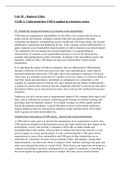Unit 20 – Business Ethics
TASK 2: Understand how CSR is applied in a business contxt
P3: Explain the concept and features of corporate social responsibility.
CSR means an organization's responsibility for the effects of its actions and activities on
people and the environment, resulting in ethical behaviour and openness that helps
sustainable development, encompassing society's health and well-being; taking into account
stakeholders' expectations and abiding by the law. Every company should understand how to
apply corporate social responsibility and procedures in order to function in an ethical manner.
The explanation will aid internal and external stakeholders in comprehending the
characteristics of corporate social responsibility practises as well as the elements they
consider when putting them in place. Externally, in relation to the surrounding society, and
internally, within the firm, CSR implies having social responsibility toward various
stakeholders.
If we talk about the impact of CSR on consumers; they are influenced by CSR primarily
through a collection of criteria like perceived value, trust, and dedication, which leads to
increased satisfaction and loyalty. CSR adds value to the consumer's experience. Perceived
value refers to a customer's assessment of a product or service's merits, as well as its ability to
meet their needs and expectations, particularly in comparison to its competitors. so for
example if a customer perceives that the new spicy chicken big mac burger of MacDonald’s
is going to be much tastier and juicer then the competitors then that’s a perceived value and if
the business follows up on such perceived values, then u end up with satisfied and long term
customers.
Employees can feel a strong sense of organisational support if the company takes steps to aid
them, such as offering fair treatment, conducting good working environment training, and
providing career development chances. For example, treating everybody equally and not
having discrimination problems. A good CSR makes it easier to hire quality employees,
reduces employee turnover, and increases employee loyalty and motivation, all of which
leads to greater invention and productivity.
Characteristics and purpose of CSR reports – internal and external stakeholders.
A CSR report’s major goal is to increase the transparency of an organization's actions. Also,
CSR reports are designed to help businesses assess (the triple bottom line) their impact on the
environment, society, and economy. Companies will be able to obtain reliable and
meaningful data in this manner, allowing them to enhance their processes and have a more
positive impact on society and the planet. It's also worth noting that a CSR report allows
organisations to convey their sustainability and CSR goals to their stakeholders on an
external level. Customers, investors, the government, NGOs, and suppliers, among other
interested parties, can learn more about a company's short, medium, and long-term goals and
make more educated decisions as a result of this. These choices can range from investing in a
company, purchasing its products, posting positive (or negative) comments, to marching in
the streets against an organization's aims or conduct. The same can be said for internal




